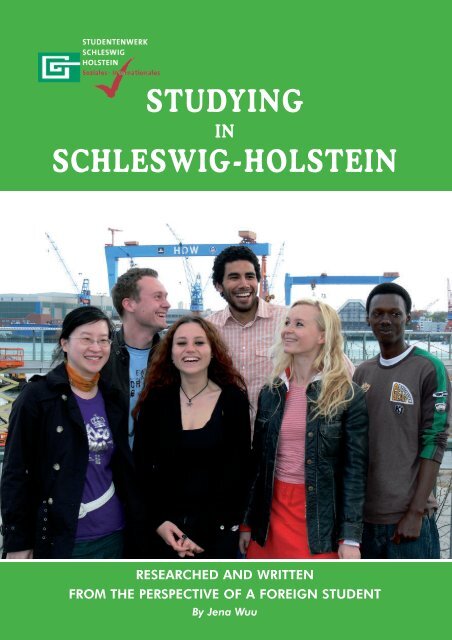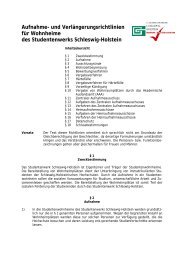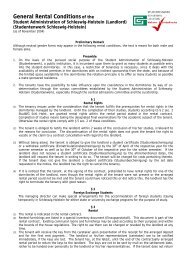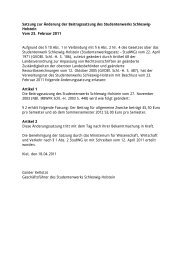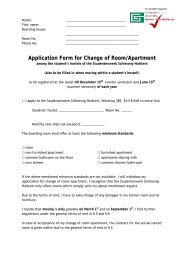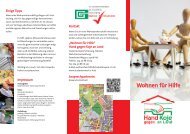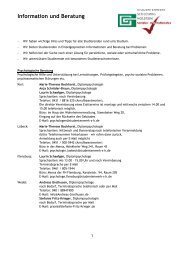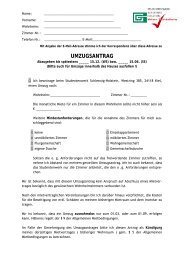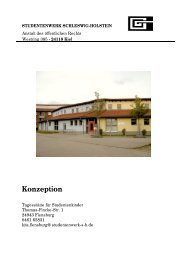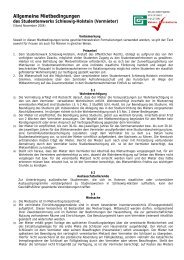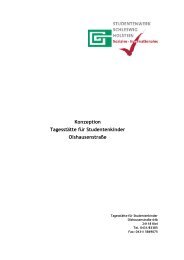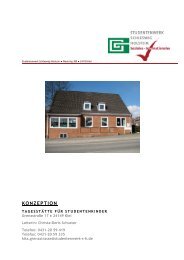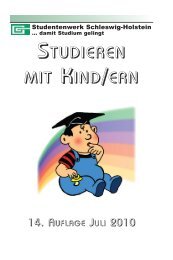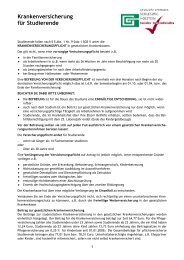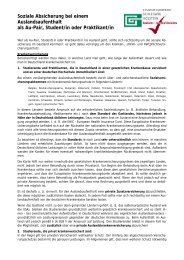B a S IS - Studentenwerk Schleswig-Holstein
B a S IS - Studentenwerk Schleswig-Holstein
B a S IS - Studentenwerk Schleswig-Holstein
Create successful ePaper yourself
Turn your PDF publications into a flip-book with our unique Google optimized e-Paper software.
STUDYING<br />
IN<br />
SCHLESWIG-HOLSTEIN<br />
RESEARCHED AND WRITTEN<br />
FROM THE PERSPECTIVE OF A FOREIGN STUDENT<br />
By Jena Wuu
Research, Text and Layout-Idea by Jena Wuu<br />
under the direction of:<br />
Constanze Pohlenk, Renko Buß<br />
<strong>Studentenwerk</strong> <strong>Schleswig</strong>-<strong>Holstein</strong><br />
Westring 385, 24118 Kiel<br />
internationales@studentenwerk-s-h.de<br />
Most Photos by Renko Buß, Katarzyna Dec-Merkle and Jena Wuu<br />
Special thanks to those who helped with this project: Katrin Bischoff, Renko Buß,<br />
Astrid Dürkoop, Ilsedore Keitel, Birgit Mönch, Dita Ogurreck, Thomas Plöger,<br />
Hans-Jürgen Tank, Jörg Westphal, the International Center of CAU, the International<br />
Center of Fachhochschule Lübeck, the Career Center of CAU, CAU AStA,<br />
the Ausländerbehörde in Kiel, the Rathaus in Kiel and Flensburg, the Verbraucherzentrale<br />
<strong>Schleswig</strong>-<strong>Holstein</strong> in Kiel and the European Consumer Center in<br />
Kiel.<br />
Kiel, August 2012<br />
This brochure was made possible through the Studentenservice International<br />
Program of the Robert Bosch Stiftung and Deutsches <strong>Studentenwerk</strong>.<br />
We would like to express our gratitude to these organizations for this<br />
opportunity.
Table of Contents<br />
INTRODUCTION - MOIN MOIN! 4<br />
STUDENTENWERK SCHLESWIG-HOLSTEIN: WHO WE ARE 7<br />
ACADEMIC INSTITUTIONS 17<br />
PUBLIC•OFFICES 23<br />
SUPPORT AND SERVICE FOR INTERNATIONAL STUDENTS 29<br />
STUDENT HOUSING IN SCHLESWIG-HOLSTEIN 35<br />
STARTING YOUR LIFE IN GERMANY 45<br />
EVERYDAY LIFE IN GERMANY 53<br />
3
Moin Moin!<br />
WELCOME TO SCHLESWIG-HOLSTEIN!<br />
4<br />
One of the smallest German states, <strong>Schleswig</strong>-<strong>Holstein</strong> lies<br />
between the North and Baltic Seas. Here, you can enjoy a<br />
variety of natural landscapes, including low flatlands on<br />
the west and bays, beaches, and fjords on the east.<br />
<strong>Schleswig</strong>-<strong>Holstein</strong> offers a diverse climate, with windy winters<br />
and hot summers – so make sure to bring clothing for<br />
all types of weather! There are many opportunities to enjoy<br />
the natural scenery year-round with winter sports and sum-<br />
Holsten Tor, Lübeck<br />
mer sailing. One of the largest events of the year is the<br />
international Kieler Woche, the world’s biggest sailing event, which takes place<br />
every summer in Kiel, <strong>Schleswig</strong>-<strong>Holstein</strong>’s capital.<br />
You will soon discover that the culture in <strong>Schleswig</strong>- <strong>Holstein</strong>, a historically<br />
Protestant state with a growing Muslim community, carries a traditional mix of<br />
Viking, German and Danish backgrounds. This is evident in the castles and<br />
manors scattered throughout the state. There<br />
are also a number of museums that have preserved<br />
<strong>Schleswig</strong>-<strong>Holstein</strong>’s unique intercultural<br />
history.<br />
We hope that you enjoy the diverse opportunities<br />
of culture, outdoor activity, and special<br />
events during your studies in beautiful<br />
<strong>Schleswig</strong>-<strong>Holstein</strong>.<br />
Sailing on the Kiel Fjord.
Welcome to<br />
STUDENTENWERK SCHLESWIG-HOLSTEIN!<br />
During my time as an international student in<br />
<strong>Schleswig</strong>-<strong>Holstein</strong>, I experienced first-hand many of<br />
the challenges and benefits of living and studying in<br />
a foreign country. Through its commitment to students’<br />
well-being, the <strong>Studentenwerk</strong> asked me to<br />
draw on my own experiences and collect the bits of<br />
information that have helped me during my time<br />
here.<br />
Jena Wuu<br />
That is just what I did, and<br />
together, the <strong>Studentenwerk</strong><br />
and I have made this brochure with you in mind: from an<br />
international student for international students. You will find<br />
information here about every aspect of living and studying<br />
in <strong>Schleswig</strong>-<strong>Holstein</strong>.<br />
Enjoy your studies in <strong>Schleswig</strong>-<strong>Holstein</strong>!<br />
www.studentenwerk-s-h.de<br />
<strong>Studentenwerk</strong> <strong>Schleswig</strong>-<br />
<strong>Holstein</strong><br />
Photo Credit:<br />
Hanna Radke, Tilman Grote<br />
All the best,<br />
Jena Wuu<br />
5
Neubau Bremerstraße Dormitory, Kiel<br />
6
Chapter 1<br />
STUDENTENWERK SCHLESWIG-HOLSTEIN:<br />
WHO WE ARE<br />
In the German higher education system, academic and student life institutions<br />
cooperate with each other to offer different services for students. The <strong>Studentenwerk</strong><br />
<strong>Schleswig</strong>-<strong>Holstein</strong> is an independent institution that provides various types<br />
of social support for students throughout the state with all aspects of student life.<br />
7<br />
WHO WE<br />
ARE
OUR DORMITORIES<br />
It is vital for you to have a comfortable and affordable room close to your classes<br />
and activities. Fortunately, the <strong>Studentenwerk</strong> <strong>Schleswig</strong>-<strong>Holstein</strong> works to provide<br />
a variety of opportunities for students to live in a number of student dormitories<br />
(das Studentenwohnheim) at an affordable price.<br />
The Wohnheimverwaltung is the Department of Housing and is the administrative<br />
office for all of the student dormitories of the <strong>Studentenwerk</strong> <strong>Schleswig</strong>-<br />
<strong>Holstein</strong>. You can direct all questions regarding housing to the<br />
Wohnheimverwaltung.<br />
The Wohnheimverwaltung’s open office hours are available on the Internet at<br />
www.studentenwerk-s-h.de � Wohnen/Housing. If you are unable to meet with<br />
someone at the Wohnheimverwaltung during these times, you can also make a<br />
special appointment by telephone or by email.<br />
Contact:<br />
Steenbeker Weg 20<br />
24106 Kiel<br />
Telephone: 04 31 / 8816 – 300<br />
Fax: 04 31 / 8816 – 330<br />
Email: wohnen@studentenwerk-s-h.de<br />
Internet: www.studentenwerk-s-h.de � Wohnen/Housing<br />
8<br />
Petra Carstens, Katrin Bischoff, Sabine Plank,<br />
Representatives of the Wohnheimverwatlung
SOCIAL SERVICES<br />
The <strong>Studentenwerk</strong> offers a wide variety of opportunities for support and counseling.<br />
General Social<br />
Counseling<br />
� Employment While Studying<br />
� Social Benefits<br />
� Health Insurance<br />
Contact:<br />
soziales@studentenwerk-s-h.de<br />
SOCIAL<br />
SERVICES<br />
BaS<strong>IS</strong>: Support and Service for<br />
International Students<br />
The Office of Support and Service for<br />
International Students (BaS<strong>IS</strong>) offers<br />
all international students support<br />
regarding living abroad while studying<br />
in <strong>Schleswig</strong>-<strong>Holstein</strong>.<br />
Contact:<br />
Constanze Pohlenk<br />
04 31 / 88 16 – 154<br />
internationales@studentenwerk-s-h.de<br />
www.studentenwerk-s-h.de � international<br />
Psychological<br />
Counseling<br />
This service is available<br />
to all students free of charge.<br />
It is also anonymous.<br />
Contact:<br />
psychologen@studentenwerk-s-h.de<br />
Child Daycare Services<br />
(KiTa)<br />
There are five KiTas open exclusively for<br />
the children of students in <strong>Schleswig</strong>-<br />
<strong>Holstein</strong>: three in Kiel and one each in<br />
Lübeck and Flensburg.<br />
Contact:<br />
kinderbetreuung@studentenwerk-s-h.de<br />
International students in Kiel<br />
9<br />
WHO WE<br />
ARE
TIPS<br />
The Mensas often<br />
have special offers,<br />
which can range from<br />
authentic ethnic foods<br />
to dessert buffets to<br />
students’ recommended<br />
recipes! Keep<br />
your eye out for these<br />
special deals!<br />
Want to know what’s<br />
being served in the<br />
Mensa, but don’t want<br />
to walk all the way<br />
over there? Pick up a<br />
POTTKIEKER at the<br />
beginning of every<br />
month from the<br />
<strong>Studentenwerk</strong>. Inside,<br />
there’s a Mensa menu<br />
for the whole month!<br />
The <strong>Studentenwerk</strong>,<br />
university organizations,<br />
and local businesses<br />
often advertise<br />
upcoming events in<br />
the Mensas by laying<br />
out flyers and newsletters<br />
on the tables.<br />
Check out what’s<br />
happening on campus<br />
and throughout<br />
town while you eat!<br />
10<br />
OUR CANTEENS<br />
Lunch is available in the<br />
Mensa every weekday from<br />
11:30 - 14:00, and you have<br />
the option of two main courses,<br />
a vegetarian option, and a<br />
hot pot dish, as well as side<br />
dishes, organic foods, desserts,<br />
and drinks.<br />
Mensa I, Kiel<br />
The Cafeterias offer a variety of baked goods, breads, coffees,<br />
and hot dishes, such as sausage or french fries. They<br />
are a good place to grab some breakfast, a quick lunch, or<br />
to just take a break with friends.<br />
You can use WLAN<br />
in our Mensas.<br />
As a student, you receive an extra<br />
price discount, making it possible<br />
for you to eat a full, balanced<br />
meal at a very low price!<br />
A Campus Card will help you get<br />
through the line much faster and<br />
means that you don’t have to<br />
carry around cash! Plus, you can<br />
use your Campus Card for other things too, like making<br />
copies or printing at the university.<br />
Ask for the Campus Card at the Information Desk!
The Mensas are located at:<br />
Kiel<br />
Mensa I<br />
Westring 385<br />
24118 Kiel<br />
Mensa in der Seeburg<br />
Düsternbrooker Weg 2<br />
24105 Kiel<br />
Lübeck<br />
Mensa Lübeck<br />
Mönkhofer Weg 241<br />
23562 Lübeck<br />
Flensburg<br />
Mensa Flensburg<br />
Kanzleistraße 94<br />
24941 Flensburg<br />
Smoking is strictly forbidden<br />
in all Mensas and Cafeterias!<br />
Mensa II<br />
Leibnizstraße 14<br />
24118 Kiel<br />
Schwentine-Mensa<br />
Grenzstraße 14<br />
24149 Kiel<br />
Mensa und Cafeteria<br />
in der Musikhochschule<br />
Große Petersgrube 17-19<br />
23552 Lübeck<br />
Mexican Days in our Mensa.<br />
11<br />
WHO WE<br />
ARE
BAföG - STUDENT FINANCIAL AID<br />
BAföG (das Bundesausbildungsförderungsgesetz) is public financial aid for students.<br />
It helps students not just with the fees and costs of studying, but also with<br />
living costs throughout the course of study.<br />
As an international student, you may be eligible for<br />
BAföG if you are studying or living in Germany on a long-term basis and<br />
meet one or more of the following conditions:<br />
� You are in Germany for political asylum, or are another kind of<br />
refugee, and are officially recognized as such.<br />
� You are protected by Abschiebungsschutz, meaning that you are legally<br />
able to avoid deportation from Germany (only § 60 I Aufenthaltsgesetz).<br />
� Your spouse is a German citizen and you live both in the same household.<br />
� At least one of your parents is a German citizen.<br />
� At least one of your parents has lived in Germany for the last six years<br />
and has worked at least three of those years.<br />
� You worked and lived at least five years in Germany prior to the beginning<br />
of your enrollment in <strong>Schleswig</strong>-<strong>Holstein</strong>.<br />
� You did this with a work permit (die Arbeitserlaubnis); you were<br />
insured; and you were able to support yourself during this time.<br />
m For EU-Members and Contract Countries: You have worked<br />
at least six months in Germany, and your course of study<br />
corresponds with your work.<br />
The open office hours of BAföG are online at:<br />
www.studentenwerk-s-h.de � BAföG<br />
Contact:<br />
Kerstin Meck-Reinhart Jörg Westphal<br />
� 04 31 / 88 16 – 206 � 04 31 / 88 16 – 168<br />
12
CULTURE<br />
The numerous opportunities offered by the Department of Culture cover a wide<br />
range of cultural outlets: Theater, Radio, Film, Music, Painting and Drawing. The<br />
Culture Department also has a library (in the <strong>Studentenwerk</strong>`s House in Kiel in<br />
the Mensa I), where students are welcome to learn more about these topics.<br />
Theater<br />
Theater is the largest section of the<br />
Culture Department, with a number<br />
of student theater groups,<br />
workshops, and regular performances.<br />
Contact:<br />
Diethard Pieske<br />
� 04 31 / 8816 - 140<br />
Music<br />
CULTURE<br />
Radio<br />
A radio station is also located in<br />
Mensa I, which exclusively plays<br />
student-run radio programs during<br />
particular times. (see page 15)<br />
Contact:<br />
www.campusradiokiel.de<br />
Painting<br />
and<br />
Drawing<br />
Film<br />
Filmmaking instruments,<br />
including cameras and editing<br />
systems are available for<br />
members’ use.<br />
Contact:<br />
Thomas Plöger<br />
� 04 31 / 88 16 – 139<br />
Photography<br />
Contact:<br />
Ines Weißenberg, Reception kultur@studentenwerk-s-h.de<br />
� 04 31 / 88 16 - 137 www.studentenwerk-s-h.de � kultur<br />
13<br />
WHO WE<br />
ARE
POTTKIEKER<br />
In POTTKIEKER, the <strong>Studentenwerk</strong>’s monthly magazine, you can find the Mensa<br />
Menus for the month, as well as articles about the recent activities and other<br />
projects of the <strong>Studentenwerk</strong>. Updated Information regarding social and cultural<br />
aspects of studying in <strong>Schleswig</strong>-<strong>Holstein</strong> is also printed in the magazine.<br />
POTTKIEKER is available for free in the Mensas.<br />
14
campusradiokiel.fm<br />
The <strong>Studentenwerk</strong> also offers students in Kiel the opportunity to produce radio<br />
programs on a student-run radio station. Students are welcome to work in the<br />
fields of Editorial (Politics, Culture, International, Sport, Career, etc.) or<br />
Production (Technology, Moderation, Marketing, etc.).<br />
Frequency:<br />
101.2<br />
When:<br />
Student programs are broadcast on the radio at special times on weekdays.<br />
How to get involved:<br />
Meetings are held weekly. If you are interested in working with the radio, stop by<br />
the meeting or send an email.<br />
E-Mail:<br />
campusradiokiel@googlemail.com<br />
Adress:<br />
Studentenhaus, Zi. 2<br />
Westring 385<br />
24118 Kiel<br />
Website:<br />
www.campusradiokiel.fm<br />
Studio-Telephone:<br />
04 31 - 88 16 - 237<br />
You can find more information about the radio station at its website.<br />
You will also find more student-written articles there.<br />
Guido and Mustafa at<br />
the event “Open World”<br />
15<br />
WHO WE<br />
ARE
Fachhochschule Kiel<br />
16
Chapter 2<br />
ACADEMIC INSTITUTIONS<br />
When studying in <strong>Schleswig</strong>-<strong>Holstein</strong>, you will get support from various academic<br />
offices and student organizations.<br />
17<br />
ACADEMIC<br />
INSTITUTIONS
FOR INTERNATIONAL STUDENTS<br />
The International Office is your first resource for all questions or concerns regarding<br />
academic and social issues. It is also responsible for the admission, enrollment<br />
and general support for all international students. It coordinates al number<br />
of partnership programs with other academic intstitutions around the world.<br />
Each higher education institution in <strong>Schleswig</strong>-<strong>Holstein</strong> has its own International<br />
Office (Akademisches Auslandsamt).<br />
Internet sites of International Offices in <strong>Schleswig</strong>-<strong>Holstein</strong><br />
Kiel<br />
CAU Kiel<br />
www.international.uni-kiel.de<br />
Muthesius Kunsthochschule<br />
www.muthesiuskunsthochschule.de/en/<br />
international_students.php<br />
Lübeck<br />
Universität zu Lübeck<br />
http://www.uni-luebeck.de/<br />
studium/international-office.html<br />
Musikhochschule Lübeck<br />
http://www.mh-luebeck.de/<br />
studium/erasmus<br />
Flensburg<br />
Universität Flensburg<br />
www.uni-flensburg.de/international<br />
18<br />
Fachhochschule Kiel<br />
http://www.fh-kiel.de/index.php<br />
?id=110<br />
The International Center of the<br />
CAU in Kiel.<br />
Fachhochschule Lübeck<br />
http://www.fh-luebeck.de/Inhalt/<br />
02_Studierende_Ch021/<br />
07_Internationales/index.html<br />
Fachhochschule Flensburg<br />
www.fh-flensburg.de/fhfl/<br />
international.html
GENERAL SUPPORT<br />
AStA<br />
Allgemeiner Studierendenausschuss<br />
AStA is the equivalent of a student government. It is<br />
a group of annually elected students who organizes<br />
and funds student organizations, extracurricular activities,<br />
and campus-wide parties.<br />
AStA also provides a variety of student counseling,<br />
ranging from employment and internships to specific<br />
courses of study to students legal rights. There is<br />
also special counseling for international students.<br />
Please check your local AStA website to find out<br />
when specific counseling is available. Look for a person<br />
called Ausländerreferent.<br />
Kiel<br />
CAU Kiel<br />
info@asta.uni-kiel.de<br />
www.asta.uni-kiel.de<br />
Fachhochschule Kiel<br />
vorstand_1@asta.fh-kiel.de<br />
vorstand_2@asta.fh-kiel.de<br />
www.asta-fh-kiel.de<br />
Muthesius Kunsthochschule Lübeck<br />
asta@muthesius.de<br />
Universität zu Lübeck<br />
www.muthesius-kunsthochschule. info@asta.uni-luebeck.de<br />
de/de/studierende/asta/ www.asta.uni-luebeck.de<br />
Fachhochschule Lübeck<br />
info@asta-fhl.de<br />
www.asta-fhl.de<br />
Flensburg<br />
Universität Flensburg<br />
asta@uni-flensburg.de<br />
flensburg-studieren.de/de/<br />
uni/asta/aktuelles<br />
Dancing at Indian Night, one of<br />
many events organized by AStA.<br />
Photo Credit: Philipp Diepmans<br />
Musikhochschule Lübeck<br />
asta@mh-luebeck.de<br />
www.mh-luebeck.de/hochschule/<br />
gremien/asta-und-stupa<br />
Fachhochschule Flensburg<br />
asta@fh-flensburg.de<br />
flensburg-studieren.de/de/fh/<br />
asta/aktuelles<br />
19<br />
ACADEMIC<br />
INSTITUTIONS
ACADEMIC SUPPORT<br />
Zentrale Studienberatung<br />
All higher education institutions in <strong>Schleswig</strong>-<strong>Holstein</strong> offer personal, general<br />
academic counseling regarding academic matters, such as choosing or<br />
changing a course of study, test preparation, and studies planning.<br />
You can find the contact information and open hours of the Zentrale<br />
Studienberatung on the website of your study institution.<br />
Studienfachberater<br />
Each institute has a specialist, who is responsible for councelling students within<br />
the particular study direction. Here You can find out, what combination of lectures<br />
can be the most appropriate for you.<br />
Fachschaften<br />
Most academic departments have a student representative<br />
group called Fachschaft. The students in<br />
the Fachschaft are responsible for a variety of duties,<br />
including hosting department parties and social<br />
gatherings, archiving past projects and exams, and<br />
advising other students in the department.<br />
The Fachschaft is a good resource for specific questions<br />
regarding your personal course of study and<br />
department. Check to see how to contact the different<br />
Fachschaften at your school.<br />
Sprechstunden<br />
For more specific information regarding seminars and courses of study, you can<br />
also visit your professors during their open office. hours. You can usually find a<br />
professor’s office hours online or in your course material.<br />
20<br />
The Biology Fachschaft advises<br />
students at Information Day for<br />
First Semester students.
CAREER SERVICES<br />
Each of the three universities in <strong>Schleswig</strong>-<strong>Holstein</strong> offer career preparation and<br />
counseling services through a Career Center. There, you can receive advice on<br />
planning for your career, preparing your resume, and the job application process.<br />
They also offer regular seminars regarding these topics.<br />
Kiel<br />
CAU Kiel<br />
Claudia Fink<br />
� 04 31 / 880 12 51<br />
careercenter@uv.uni-kiel.de<br />
Lübeck<br />
Universität zu Lübeck<br />
Dr. Sabine Voigt<br />
� 04 51 / 500 30 09<br />
voigt@zuv.uni-luebeck.de<br />
Flensburg<br />
Universität Flensburg<br />
Ellen Kittel-Wegner<br />
� 04 61 / 805 2569<br />
CareerService@uni-flensburg.de<br />
Handbooks for the Contacts Job<br />
Fair of the Career Center in Kiel<br />
21<br />
ACADEMIC<br />
INSTITUTIONS
Town Hall and Opera House, Kiel<br />
22
Chapter 3<br />
PUBLIC INSTITUTIONS<br />
Upon your arrival in <strong>Schleswig</strong>-<strong>Holstein</strong>, you will need to visit a few important<br />
government offices. The two main things you need to do are to get your allowance<br />
to live and study in Germany and to register as a resident of the city.<br />
Here is some important basic information about these offices and what you will<br />
need to do.<br />
23<br />
PUBLIC<br />
INSTITUTIONS
IMMIGRATION OFFICE<br />
The immigration office (die Ausländerbehörde) handles all<br />
issues regarding your visa to enter the country (das Visum)<br />
and your allowance to live and study in Germany (die<br />
Aufenthaltserlaubnis).<br />
There are different guidelines for entering Germany and<br />
receiving an allowance to live and study in Germany,<br />
depending on which country you are from.<br />
Here are some general guidelines: The town hall with the<br />
immigration office in<br />
Flensburg.<br />
If you are from an EU-country, you do not need to apply for either<br />
a Visum or an Aufenthaltserlaubnis.<br />
If you are from the following non-EU countries: Australia, Andorra,<br />
Canada, Honduras, Israel, the Republic of Korea, Japan, Monaco, New<br />
Zealand, San Marino, or the United States of America:<br />
� You may enter Germany without a special Visum or<br />
Aufenthaltserlaubnis. You are allowed to stay in Germany for three<br />
months on an automatic tourism allowance. This means that you do<br />
not need to do any applications before you travel to Germany.<br />
� If you plan to stay in Germany for longer than three months, you must<br />
go to the immigration office BEFORE your three-month allowance is<br />
over to apply for an Aufenthaltserlaubnis, in order to legally remain in<br />
the country.<br />
If you are from another country, you must visit the German embassy (die<br />
Botschaft) in your home country BEFORE you travel to Germany, in order to<br />
apply for a Visum and an Aufenthaltserlaubnis.<br />
24
APPLYING FOR YOUR AUFENTHALTSERLAUBN<strong>IS</strong><br />
When applying for an Aufenthaltserlaubnis, you must bring the following<br />
items with you:<br />
� One biometric photo<br />
� Your valid passport<br />
� Proof that you are medically insured<br />
� Proof of your matriculation at a university, college, or technical school<br />
in <strong>Schleswig</strong>-<strong>Holstein</strong><br />
� Official proof that you are able to financially support yourself during<br />
your time in Germany<br />
� Proof of Stipend or Fellowship<br />
� Savings Account Statement<br />
� Proof of Guarantor (private financial support), e.g. your parents<br />
WorkPermit (die Arbeitserlaubnis)<br />
Depending on which country you come from and what kind of<br />
Aufenthaltserlaubnis you have, you may have one of the following options in<br />
your visa:<br />
� an automatic, unlimited work permit<br />
� a limited work permit<br />
� no work permit<br />
Appointment at the immigration office in Kiel<br />
Since July 2009 international students have to follow a new procedure for the<br />
arrangements at the immigration office:<br />
You need to call your contact person and make an appointment in advance.<br />
BaS<strong>IS</strong> at <strong>Studentenwerk</strong> and International Office (Center) of your university<br />
can give you information, who is in charge.<br />
25<br />
PUBLIC<br />
INSTITUTIONS
TIPS<br />
In some cases, you<br />
might have to pay<br />
when you apply for<br />
your Aufenthaltserlsubnis.<br />
These fees are<br />
payable at your local<br />
embassy or at the<br />
immigration office by<br />
cash or EC-Karte.<br />
Marriage partners<br />
and children of international<br />
students must<br />
also apply for an<br />
Aufenthaltserlaubnis if<br />
they want to live with<br />
you in Germany. You<br />
will be expected to<br />
have more financial<br />
support per month, in<br />
order to support your<br />
family while you are<br />
here.<br />
The waiting line can<br />
be very long at the<br />
immigration office!<br />
Make sure to either<br />
get there early or to<br />
go when you have a<br />
lot of time!<br />
26<br />
Immigration Office Contact Information:<br />
Kiel<br />
Fabrikstraße 8-10<br />
24103 Kiel<br />
� 04 31 / 90 10<br />
Lübeck<br />
Dr. Julius Leber Straße 46-48<br />
23539 Lübeck<br />
� 04 51 / 12 20<br />
Flensburg<br />
Am Rathausplatz 1<br />
24937 Flensburg<br />
Nicole Ertzinger<br />
� 04 61 / 85 26 47<br />
CITY REG<strong>IS</strong>TRATION OFFICE<br />
Regardless of whether they are international<br />
or German citizens, all residents<br />
of a city are required to register, so that<br />
there everyone’s current addresses are<br />
on file. The resident registration office<br />
(das Einwohnermeldeamt or die Meldestelle)<br />
is usually located in the old town<br />
hall (das Rathaus).<br />
Registering as<br />
a resident.
Registration<br />
Upon your arrival, you have two weeks to register (die Anmeldung) with the resident<br />
registration office to become a legal resident of your city.<br />
You will need to take your housing contract and your passport. There is no fee<br />
to register. However, if you do not register within two weeks of moving in, you<br />
may be subjected to a penalty fee. If you move apartments within the same city,<br />
you must re-register with your new address!<br />
De-Registration<br />
There are different guidelines on de-registration (die Abmeldung), when you<br />
move out of town:<br />
� If you move to a different city within Germany only, you do not have to<br />
de-register. You must only remember to register in your new city of residence.<br />
� If you move to a different country, you must de-register at the resident<br />
registration office before you leave.<br />
Kiel<br />
Fleethörn 9 � 24103 Kiel<br />
� 04 31 / 90 10<br />
Flensburg<br />
City Registration Offices:<br />
Am Rathausplatz 1 � 24937 Flensburg<br />
� 04 61 / 85 21 24<br />
Lübeck<br />
Dr-Julius-Leber-Straße 46-48 � 23552 Lübeck<br />
� 04 51 / 12 20<br />
27<br />
PUBLIC<br />
INSTITUTIONS
Chapter 4<br />
HAVE QUESTIONS? GO TO BaS<strong>IS</strong>!<br />
The Office of Support and Service for International Students (BaS<strong>IS</strong>) is a service<br />
of the <strong>Studentenwerk</strong>’s Social Services Department. Through various projects,<br />
cultural activities and seminars BaS<strong>IS</strong> promotes the social integration and wellbeing<br />
of <strong>Schleswig</strong>-<strong>Holstein</strong>’s international students. Both international and<br />
German students regularly participate in its many programs and activities.<br />
Based in Mensa I in Kiel, the services of BaS<strong>IS</strong> are available to all international<br />
students in <strong>Schleswig</strong>-<strong>Holstein</strong>.<br />
29<br />
BaS<strong>IS</strong>
OFFERINGS OF BaS<strong>IS</strong><br />
Study Buddy Program and Campus Friends Lübeck<br />
The goal of the Study Buddy Program and Campus Friends<br />
is to facilitate intercultural exchange between German and<br />
international students in Kiel, Flensburg and Lübeck. Each<br />
participant receives contact information for either a<br />
German or an international partner. These pairings are<br />
based on similar interests and hobbies, language abilities,<br />
courses of study, etc.<br />
As part of the Study Buddy Program and Campus Friends,<br />
BaS<strong>IS</strong> offers a variety of cultural activities, including regular<br />
meetings and intercultural trainings during the semester.<br />
Wohnheimtutoren<br />
Living away from home and with<br />
people from different cultures is not<br />
always easy. To help ease you into<br />
everyday life in <strong>Schleswig</strong>-<strong>Holstein</strong>,<br />
there are designated Wohnheimtutoren<br />
in some student dormitories in Kiel and<br />
one Tutor in Flensburg and Lübeck.<br />
The Wohnheimtutoren are also international<br />
students, who live in the dorms<br />
Wohnheimtutoren<br />
and provide support to the other international<br />
residents. They organize regular<br />
activities, in order to help with the social integration and the general wellbeing<br />
of international students.<br />
Cultural activities<br />
including:<br />
� intercultural trainings<br />
� sport competitions<br />
� country evenings<br />
(Culture Sessions)<br />
30<br />
Study Buddies<br />
Polish days in the Mensa
Seminars<br />
BaS<strong>IS</strong> offers international and German students a<br />
variety of seminars, in order to further develop intercultural<br />
awareness, such as soft skills and knowledge<br />
about the legal rights of international students.<br />
Arrival Service<br />
If you arrive in Kiel outside of the regular opening<br />
times of the Wohnheimverwaltung (see page 8), the<br />
Arrival Service can pick you up free of charge and<br />
bring you to your student dormitory.<br />
Arriving in Kiel<br />
Constanze Pohlenk,<br />
BaS<strong>IS</strong> offfice coordinator<br />
Intercultural Training Seminar<br />
Through the Arrival Service, you can take care of all<br />
logistical aspects of moving in, simply and stress-free:<br />
the room keys; the rent contract and move-in protocol;<br />
and the security deposit.<br />
Please register for the Arrival Service at least a week<br />
before your arrival in Kiel. Registration is available<br />
through the postal service or online at:<br />
www.studentenwerk-s-h.de � International<br />
You are also welcome to contact<br />
the BaS<strong>IS</strong> office through<br />
telephone or email, or visit it<br />
in Studentenhaus / Mensa I<br />
(Westring 385, 24118 Kiel,<br />
1st floor, room No 7).<br />
Contact:<br />
Constanze Pohlenk<br />
04 31 / 88 16 - 154<br />
internationales@studentenwerk-s-h.de<br />
www.studentenwerk-s-h.de � International<br />
31<br />
BaS<strong>IS</strong>
32<br />
A Study Buddy Story ...<br />
Anna and Marta<br />
“The first step is always the hardest.”– This is what I was thinking when I<br />
arrived in Kiel because I had always imagined a stay in a foreign country<br />
to be difficult. I had prepared myself to feel lonely and lost during my<br />
time there but that never happened. In fact, quite the opposite! As I got<br />
a great Study Buddy my stay wasn’t lonely or boring at all. Marta didn’t<br />
just help me with all of the official things, but also introduced me to life<br />
as a student in the city. I met her friends and we went to some parties or<br />
to the theatre together. As well, I also got in touch with other international<br />
students from the Study Buddy Program, which made my stay even<br />
more enjoyable.<br />
So if you are new to Kiel or Flensburg, enrol in the Study Buddy Program.<br />
It is definitely worth it!
�<br />
Study Buddy and Campus Friends Registration<br />
Surname:<br />
First Name:<br />
Nationality:<br />
Sex:<br />
Date of Birth:<br />
Subject of Study:<br />
Languages Spoken:<br />
Hobbies / Interests:<br />
Address in Kiel / Flensburg / Lübeck<br />
Dormitory, Room Number:<br />
Street:<br />
Postal Code / City:<br />
Telephone:<br />
Email:<br />
Please bring the registration form to BaS<strong>IS</strong>!<br />
33<br />
BaS<strong>IS</strong>
International Student Dormitory, Lübeck<br />
Photo Credit:•Architekt Mai<br />
34
Chapter 5<br />
STUDENT HOUSING IN SCHLESWIG-HOLSTEIN<br />
The <strong>Studentenwerk</strong> <strong>Schleswig</strong>-<strong>Holstein</strong> works to provide a variety of opportunities<br />
for students to live in community living apartments and single apartments in<br />
a number of student dormitories at an affordable price.<br />
35<br />
STUDENT<br />
HOUSING
IN A DORMITORY<br />
How Do I Find a Room?<br />
You can apply for a room in a <strong>Studentenwerk</strong>’s student dormitory by filling out<br />
the form at the <strong>Studentenwerk</strong> website and submit it directly through the Internet.<br />
www.studentenwerk-s-h.de • Housing • Application for a room in a residence<br />
hall • Application for Admission<br />
The Wohnheimverwaltung will work to meet your<br />
requests as much as possible, and will contact you<br />
with a room assignment.<br />
Before Moving in:<br />
Make sure to keep all deadlines (die Frist) in mind; if<br />
you do not adhere to the deadlines specified to you<br />
by the Wohnheimverwaltung, you risk losing your<br />
contract!<br />
36<br />
Campus Dormitory, Flensburg<br />
� Step 1: When a room is available, the Wohnheimverwaltung will send<br />
you the room contract either through email or the Post (regular mail).<br />
Sign the contract and send it (original copy with your signature)<br />
through the Post back to the Wohnheimverwaltung.<br />
� Step 2: After the room contract with your signature is received, the<br />
Wohnheimverwaltung will sign the contract itself and send it back to<br />
you with both signatures. The room contract is now official.<br />
� Step 3: Transfer the security deposit of 250,- € directly to the<br />
Wohnheimverwaltung’s bank account. Do not forget to keep the receipt<br />
of this transaction. You can find the <strong>Studentenwerk</strong>’s bank information<br />
online at:<br />
www.studentenwerk-s-h.de • Wohnen<br />
If you cannot transfer the security deposit, you may pay it in cash upon<br />
your arrival.
Moving In<br />
When you will be moving into your<br />
room, you must have:<br />
� Your official room contract, signed<br />
by both you and the Wohnheimverwaltung<br />
� Proof of security deposit payment or<br />
the security deposit itself 250,- € in<br />
cash<br />
Studentendorf Dormitory, Kiel<br />
If your arrival is planned to be during the open hours of:<br />
� the Wohnheimverwaltung (for residents of EOH and DOH only); or<br />
� the Hausmeister (for all other dormitories)<br />
You should make an appointment with them at least one week prior to your<br />
moving in.<br />
You can find the open hours (die Öffnungszeiten) of the Wohnheimverwaltung<br />
online at: www.studentenwerk-s-h.de • Wohnen<br />
If your arrival is planned to be outside the open hours of:*<br />
� the Wohnheimverwaltung (for residents of EOH and DOH only); or<br />
� the Hausmeister (for all other dormitories)<br />
You are eligible to participate in the free Arrival Service of BaS<strong>IS</strong>. You must<br />
register for the Arrival Service, either online or through the postal service, at<br />
least one week prior to your arrival in Kiel.<br />
* The Arrival Service is only available for students studying in Kiel.<br />
37<br />
STUDENT<br />
HOUSING
TIPS<br />
To get to the<br />
Wohnheimverwaltung,<br />
take the 62 Bus<br />
(Direction:<br />
Projensdorf) to the<br />
station, Klinik Lubinus.<br />
By paying the security<br />
deposit through a<br />
bank transfer, you can<br />
have peace of mind<br />
and not carry so much<br />
cash when you travel!<br />
Just make sure that<br />
you bring proof of<br />
transfer (e.g. a printout<br />
receipt), so that<br />
you can get your<br />
room keys!<br />
Make sure to pay<br />
your rent on time!<br />
Otherwise, you’ll have<br />
to pay penalty late<br />
fees and risk losing<br />
your contract.<br />
For bank transfers,<br />
you can find the<br />
<strong>Studentenwerk</strong>’s<br />
account information<br />
online at:<br />
www.studentenwerk-sh.de<br />
� Wohnen �<br />
Housing<br />
38<br />
Terms to Know:<br />
Room Contract: der Mietvertrag<br />
In the room contract, you agree to rent a room for a<br />
specific period of time (min. 6 months) and to pay the<br />
required monthly rent for that time period. Every student<br />
is allowed to live in the dorm for a total of six semesters,<br />
and it is possible to extend this time period.<br />
Security Deposit: die Kaution<br />
You will get this money back when you move out, as<br />
long as nothing in your room is damaged.<br />
Bank Transfer: die Überweisung<br />
Rent: die Miete<br />
Warning Letter: die Mahnung<br />
If you receive a warning letter from the Wohnheimverwaltung,<br />
you must contact them immediately!<br />
Cashier: die Kasse<br />
International Breakfast in front of EOH.
Das Einzugsprotokoll<br />
The Einzugsprotokoll is an agreement that everything<br />
in your room is in working condition upon your<br />
moving in.<br />
In order to receive the keys to your room, you must<br />
sign the Einzugsprotokoll. After you sign it, you have<br />
14 days to test everything in your room. If you find<br />
out that something doesn’t work properly, you should<br />
immediately tell either the Hausmeister or the<br />
Wohnheimverwaltung. This way, you won’t have to<br />
pay any fines when you move out!<br />
Die Miete / The Rent<br />
The rent is the monthly fee for living in your room. Rent can vary, based on which<br />
dorm you live in and what kind of room you have, e.g. a single apartment or a<br />
WG, but once you have an official room contract, your rent fees will be constant<br />
for the duration of the contract.<br />
It is generally preferred that you pay your rent as a regular direct deposit from<br />
your bank account. If you have any questions about this, contact the<br />
Wohnheimverwaltung.<br />
Living in a Dorm<br />
Internet<br />
In all <strong>Studentenwerk</strong> dormitories there is Internet installed.<br />
The volume of Internet traffic is controlled by the university<br />
and is designed to support Internet usage for studying and<br />
general communication.<br />
Before then, please check if there is already Internet access<br />
in your dorm. If not, you can still receive Internet service in<br />
your room through a private telephone service.<br />
Telephone Service<br />
Most students use either mobile telephones or Internet calling<br />
instead of a landline. For more information on mobile<br />
telephones and Internet calling, see page 54.<br />
Room in Max-Kade-Haus, Kiel<br />
A chess tournament<br />
in PHH.<br />
39<br />
STUDENT<br />
HOUSING
TIPS<br />
Stay aware when<br />
cooking with oil!<br />
When left unattended,<br />
it can be easy to start<br />
a fire!<br />
You can save energy<br />
(and money) when<br />
you hang your clothes<br />
to dry on the lines,<br />
rather than using the<br />
dryer. Do this at your<br />
own risk, since the<br />
clothes will be left in<br />
the open - just make<br />
sure you always lock<br />
the door to the laundry<br />
room when you<br />
leave!<br />
The wash machines<br />
and dryers are<br />
serviced by a private<br />
company, which is<br />
available 24 hours a<br />
day for customer service.<br />
If you need help<br />
with a machine, please<br />
call the telephone<br />
number on the wall of<br />
the laundry room, rather<br />
than the Hausmeister.<br />
40<br />
Laundry Facilities (der Wäscheraum)<br />
There are wash machines, dryers and drying lines in every<br />
<strong>Studentenwerk</strong> dorm - just bring your own detergent. One<br />
load of laundry costs 1,50 € to wash and 1,- € to dry. Make<br />
sure to have correct change, because the machines can neither<br />
give change nor accept coins less than 0,50 €.<br />
Cleanliness (die Sauberkeit)<br />
Although a professional cleaning staff cleans some public<br />
areas in the dorms, most of the cleanliness is your own<br />
responsibility! In addition, the Wohnheimverwaltung checks<br />
the cleanliness of all dorms once a semester!<br />
If the shared spaces in your<br />
apartment are unsatisfactory<br />
after two checks, then you and<br />
your roommates will have to pay<br />
for a professional cleaning service<br />
to come in. The fees are<br />
dependant on the type of<br />
cleaning that is required - but<br />
they can range from 10,- € to<br />
more than 30,- €.<br />
Community Spaces (der Gemeinschaftsraum)<br />
There is a variety of opportunities for<br />
hobbies and other activities in the<br />
<strong>Studentenwerk</strong> dorms, such as music<br />
rooms, libraries, grills, and Kicker<br />
tables. You can reserve these rooms<br />
through the Heimrat (see p. 41) of your<br />
dorm. Different activities, organized by<br />
dorm residents, student organizations,<br />
and the <strong>Studentenwerk</strong>, periodically<br />
take place in these spaces, as well.<br />
Kitchen in International Student<br />
Dormitory, Lübeck<br />
Playing billards in the<br />
dormitory.<br />
Smoking cigarettes in the dormitories<br />
is only allowed in your room!
Who is there to help?<br />
Die Wohnheimverwaltung<br />
The Wohnheimverwaltung is there to help with<br />
any aspect of living in a <strong>Studentenwerk</strong> dorm.<br />
Please see page 8.<br />
Der Hausmeister<br />
The Hausmeister of your dorm is responsible<br />
for the building, property, and general area<br />
around the dorm. He or she has open office<br />
hours twice a week in your dorm – you can<br />
also make an appointment outside of those<br />
hours.<br />
Contact the Hausmeister if:<br />
� Something is broken in your apartment or in the public spaces of the<br />
dormitory<br />
� You would like to install telephone or Internet service through a private<br />
firm<br />
If something is broken in your room, you can fill out the short “Mitteilung an die<br />
Hausmeisterei” form, which gives the Hausmeister permission to enter your<br />
room without you. In other words, things in your room can be repaired while you<br />
are in class or at work!<br />
Der Heimrat<br />
The Heimrat of a dormitory is a group of dorm residents elected every semester.<br />
The Heimrat cares for a number of aspects of the dorm:<br />
� Responsibility of community spaces<br />
� Organization of various dorm-wide activities and trips<br />
� Representation of the residents’ interests<br />
Getting information at Max-Kade-Haus,<br />
Kiel.<br />
You should see, who your Heimrat representatives are. Through them you can<br />
reserve community spaces and suggest new activities for the dorm. Of course,<br />
they are also there to support you when you need it!<br />
41<br />
STUDENT<br />
STUDENT<br />
HOUSING<br />
HOUSING
Die Wohnheimtutoren<br />
The Wohnheimtutoren are themselves international students who work through<br />
the BaS<strong>IS</strong> Office to help facilitate social integration and the general well-being<br />
of international students in some of the biggest dorms (please see page 31).<br />
Good communication with your roommates (die Mitbewohner) is key. At the<br />
beginning of the semester, have a meeting and set up rules for your common life<br />
in the WG (die Wohngemeinschaft).<br />
42<br />
The Wohnheimtutoren are there to support you if you have any questions while living<br />
in the dorm. They also organize regular activities and hold weekly office hours.
IN A PRIVATE APARTMENT<br />
It is also possible to rent a room in a private dormitory or in a privately owned<br />
apartment. You can find more information about this:<br />
� Advertisements in Newspapers and Magazines, e.g.:<br />
Kieler Nachrichten, Kieler Express<br />
� Advertisements on the Message Board<br />
� Internet Websites, e.g.: www.meinestadt.de, www.wg-gesucht.de<br />
Some advantages to living in a private apartment are:<br />
� You have more choice in what part of town and<br />
with whom you will live<br />
� In many cases, you have more general freedom<br />
Some disadvantages to living privately are:<br />
� Your monthly rent fluctuates, based on your usage<br />
of electricity, water, heating, etc. per month. These<br />
changes are often unpredictable.<br />
� It is often more difficult to handle all of the issues<br />
with living on your own, in a private apartment,<br />
e.g. repairing broken things, setting up certain services,<br />
etc.<br />
Housing ads on the<br />
message board, or<br />
“Schwarzes Brett”.<br />
Private Apartments in a<br />
student neighborhood,<br />
Kiel.<br />
Terms to Know<br />
Die Kaltmiete: the monthly rent just for the<br />
apartment<br />
Die Nebenkosten: the extra costs the contribute<br />
to the monthly rent, including the costs for water, electricity,<br />
heating heating, telephone services, etc.<br />
Die Warmmiete: the total cost of living in a<br />
private apartment, in other words, the Kaltmiete plus<br />
the Nebenkosten<br />
General Emergency Telephone Number: 112<br />
German Police Telephone Number: 110<br />
43<br />
STUDENT<br />
HOUSING
Chapter 6<br />
STARTING YOUR LIFE IN GERMANY<br />
It is very important to make sure that you are taken care of during your time in<br />
Germany. Both insurance and finance are very tricky topics with many subtleties<br />
and rules. Living and studying internationally can make it even more complex.<br />
Please make sure that you are well-informed about your personal situation, so<br />
that you can make the best decisions for yourself and your family.<br />
You can also inform yourself at these websites:<br />
� www.howtogermany.com<br />
� www.die-gesundheitsreform.de<br />
� www.deutsche-sozialversicherung.de<br />
� www.union-verdi.de/dsw-studenten-kv<br />
45<br />
STARTING<br />
OUT
HEALTH INSURANCE<br />
Health insurance (die Krankenversicherung) is applicable to your doctor and<br />
dentist visits. If you become ill or if you need to visit a doctor for a regular checkup,<br />
having insurance is vital to receiving affordable healthcare. You can also use<br />
health insurance to receive affordable medications at the pharmacy (die Apotheke).<br />
Insurance Requirement (die Versicherungspflicht)<br />
ALL STUDENTS in German higher education instutions are required to be<br />
medically insured! Even if you are insured in your home country, you must<br />
provide proof that you are insured for German healthcare.<br />
The requirement begins on the first day of registration. If you cannot prove that<br />
you are medically insured, you will not be able to register for courses.<br />
Foreign Students meeting at least one of the following criteria are<br />
eligible for public insurance:<br />
� those registered at state or state-recognized higher education institutions<br />
� those in further or specialization courses of study<br />
(das Erweiterungs- oder Aufbaustudium)<br />
� working at an internship (das Praktikum) during the<br />
course of study<br />
The following foreign students are ineligible<br />
for public insurance:<br />
• Doctoral students (Doktoranden)<br />
� those over the age of 30 years<br />
� those who have studied for more than 14 semesters<br />
� enrolled in university German language courses or at a university preparation<br />
course (das Studienkolleg)<br />
46<br />
It is very important<br />
to find the right<br />
coverage for your<br />
personal situation.
Types of Insurance<br />
Depending on your status in Germany, your age, your nationality, your marital<br />
status, and the duration of your course of study, you may have to confront different<br />
conditions for health insurance.<br />
Public (gesetzliche) versus Private (private Versicherung)<br />
Insurance<br />
About Public Insurance<br />
� consistent monthly fees for students<br />
among all insurance carriers<br />
� coverage of medical services,<br />
including emergency care, is<br />
standardized among carriers<br />
� equal costs for men and women<br />
� long term contract<br />
About Private Insurance<br />
� lower monthly fees for students<br />
� big differences and insecurity of<br />
coverage among services<br />
� short term contracts for international<br />
students<br />
� once willingly under private insurance,<br />
it is very difficult to switch<br />
back to public insurance<br />
In general, it is better for students to be public insured because you can then be<br />
� For EU Members: Before you come to Germany, please<br />
check with your home insurance on whether You are entitled<br />
to the European Health Insurance Card, which can give you<br />
some access to healthcare if you become ill or injured while<br />
traveling within the EU.<br />
Weigh your options before picking<br />
an insurance policy.<br />
certain which services will be covered for the long<br />
term.<br />
Make sure to get the best insurance coverage for<br />
your individual situation. Travel insurance (die Reiseversicherung)<br />
is not the same thing as health insurance.<br />
You will not be considered medically insured<br />
if you only have travel insurance.<br />
47<br />
STARTING<br />
OUT<br />
OUT
WHAT TO DO, WHEN YOU NEED A DOCTOR ...<br />
� Step 1:<br />
Use the Internet or a telephone book to find a nearby general medicine<br />
practice. When you call them to make an appointment, make sure that<br />
the office will accept your insurance.<br />
� Step 2 (for the publicly insured):<br />
Take 10,- • cash with you to your appointment. This is a required fee<br />
that will cover future doctor’s visits for a three-month period. That<br />
means, if you visit the doctor again after three months, you will be<br />
required to pay the fee again.<br />
You must also take your insurance card!<br />
� Step 3:<br />
If you need to see a specialist, ask your general physician for a reference.<br />
That way, you can visit the specialist for free. You can call the<br />
specialist to make an appointment.<br />
TERMS TO KNOW<br />
Die Praxis: Doctor’s office; A clinic<br />
Die Praxisgebühr: A required fee (10,- •) that<br />
covers doctor’s visits for a three-month period<br />
Der Termin: Appointment<br />
Der Hausarzt / Der Allgemeinarzt: General physician<br />
Der Spezialist: Specialist<br />
Die Krankenkasse: Health insurance company<br />
Der Notdienst: Doctors and Apotheken that are available for emergency<br />
care. They are also available evenings and on weekends.<br />
Private insurance may work differently. Please check on your individual situation<br />
to learn how to properly use your private insurance.<br />
48<br />
Pick up medicines at the<br />
Apotheke, which is marked<br />
with this symbol.
OTHER TYPES OF INSURANCE<br />
Accident Insurance<br />
Public accident insurance (die Unfallversicherung) is provided to all students<br />
during the course of study and during an internship. However, there are many<br />
conditions and rules on what is covered and what is not.<br />
Accident insurance does NOT cover accidents that occur in the following<br />
scenarios:<br />
� during free time, i.e. not during a university- or work-sponsored activity<br />
� while participating in strikes and demonstrations<br />
� during private trips, even those related to your studies<br />
� while working study- or work-related assignments at home<br />
� during private interruptions in transport on the way to or from study- or<br />
work-related activities (e.g. stopping by the grocery store on the way<br />
home)<br />
The accident insurance provider<br />
for all students in <strong>Schleswig</strong>-<strong>Holstein</strong> is:<br />
Unfallkasse <strong>Schleswig</strong>-<strong>Holstein</strong><br />
Seekoppelweg 5a<br />
24113 Kiel<br />
� 04 31 / 6407 – 0<br />
www.uk-nord.de<br />
ukn@uk-nord.de<br />
Liability insurance will help you cover<br />
Liability Insurance<br />
unexpected costs inflicted on others.<br />
Imagine this. It’s a beautiful summer day in<br />
<strong>Schleswig</strong>-<strong>Holstein</strong> and you are outside with some friends riding bikes. In your<br />
zeal and athletic vigor, you turn a corner too fast, accidentally scratch a parked<br />
car with your pedal.<br />
Liability insurance (die Haftpflichtversicherung) will cover any costs you may<br />
accidentally inflict on someone else. Although students are not required to have<br />
liability insurance, it is still a good idea to look into getting liability insurance,<br />
especially if you are planning to stay in Germany for a longer period of time (i.e.<br />
more than one year).<br />
49<br />
STARTING<br />
OUT OUT
BANKING IN GERMANY<br />
While you are studying in Germany, you will probably need to open a bank<br />
account with a German bank.<br />
Advantages to Having a Bank Account in Germany<br />
� Exchange currencies<br />
� Purchase stocks and bonds<br />
� Take out a mortgage<br />
� Purchase travelers’ checks<br />
� Make international electronic transfers<br />
� Convenience through online banking<br />
Opening an Account<br />
Before you open an account, make sure to do as<br />
much research as you can. There are many subtle<br />
differences among the different banks in the area<br />
and you should try to make the best decision for your<br />
personal situation.<br />
Here are some questions to ask yourself, when looking<br />
for a bank:<br />
� Is the banking institution accessible in your home country?<br />
� What are the costs of making international transfers?<br />
� What kinds of interest (die Zinsen) does the bank offer?<br />
� What fees does the bank charge?<br />
Before meeting with the bank, check to see what documents you need to bring<br />
with you.<br />
50<br />
Maintaining a budget<br />
as a student does not have<br />
to be complicated.
Sparkonto versus Girokonto<br />
About a Girokonto<br />
� Checking account<br />
� Regularly used to make payments<br />
� Usually has no interest<br />
� Commonly used by international<br />
students in Germany<br />
OTHER TERMS TO KNOW<br />
Die Überweisung: Transfer, used when you transfer<br />
money from one account to another, such as<br />
making a one-time payment<br />
About a Sparkonto<br />
� Savings Account<br />
Der Dauerauftrag: Standing Order, used when you<br />
have regular, recurring payments of a set amount.<br />
This sum is automatically deducted from your<br />
account on a set date and transferred to the receiver’s<br />
account.<br />
Die Lastschrift: Direct Debit, used when you have regular,<br />
recurring payments of different amounts to the<br />
same receiver. For example, your telephone or electricity<br />
bills may vary from month to month.<br />
� Used to save money, not to make<br />
payments<br />
� Can sometimes collect interest<br />
Getting cash<br />
is fast and easy.<br />
Die Einzugsermächtigung: Direct Debit Authorization, a form authorizing the<br />
recipient (e.g. the telephone or the electricity company) to deduct respective<br />
amounts from your account. With this option, you have about 90 days<br />
to recall any sums taken from your account, thereby ensuring that the correct<br />
amounts are always deducted. You can also use this option to pay<br />
your housing rent in the dormitory.<br />
Die EC-Karte: Eurocheque Card, with which you can get cash or bank statements<br />
at money automats. In many cases, you can use it to make payments<br />
in a store.<br />
Der Geldautomat: Money Automat, where you can get cash or bank statements<br />
with your EC-Karte. While it is free to get cash from the Geldautomat<br />
of your bank, fees will be applied when using automats of other bank<br />
groups.<br />
51<br />
STARTING<br />
OUT<br />
OUT
Chapter 7<br />
EVERYDAY LIFE IN SCHLESWIG-HOLSTEIN<br />
Once the organizational aspects of coming to Germany are settled, you can<br />
finally relax and start getting used to your new life here.<br />
Here are some tips to help you get started.<br />
53<br />
EVERYDAY<br />
LIFE
TELEPHONE SERVICES<br />
There are many different options and pricing plans for<br />
mobile telephones and landlines, based on whom and<br />
when you place a call.<br />
Here are some quick tips for getting started:<br />
How do I plan to use the telephone?<br />
Before you decide on what type of phone and calling<br />
plan you should purchase, first consider how you plan<br />
to use the telephone:<br />
Ask yourself the following questions:<br />
� Do you plan to use the phone just for calling within Germany? Or will<br />
you also use the phone to place international phone calls?<br />
� Are you planning to use the phone primarily at night, or will you also<br />
regularly use it during the day?<br />
� If you will use your phone for international calls, consider the time differences<br />
between Germany and the countries you will be calling to<br />
determine when you will use the phone the most.<br />
� How long do you plan to stay in Germany?<br />
54<br />
Take care to know all of<br />
the options before deciding<br />
on a phone plan.
Mobile Telephones<br />
In fact, most students use mobile telephones (das Handy) as their primary<br />
phone.<br />
Here are some possible mobile telephone plans:<br />
A Contract (Der Vertrag)<br />
� Usually lasts a minimum of one to two years<br />
� You will often get a very nice Handy at very little or no cost.<br />
� Once you sign a contract, it can be very difficult to cancel it, so make<br />
sure you understand everything beforehand.<br />
Homezone<br />
� An option when you have a contract.<br />
� Turns your Handy into a local landline (das Festnetz) number, as well.<br />
Therefore, you can place to and receive calls from local landline numbers,<br />
as if your Handy was also a local landline number.<br />
Prepaid Cards<br />
� A good option if you will not be in Germany long enough to have a<br />
contract<br />
� In most cases, you will have to purchase a Handy at regular cost.<br />
� You must buy credit (das Guthaben) to load (aufladen) onto your<br />
phone. You can buy credit for your phone from mobile telephone service<br />
providers, gas stations, online, or even at some cash machines (der<br />
Geldautomat). Credit is sold by money value - not by time.<br />
� If you end up staying in Germany longer than you’d first expected and<br />
would like to switch to a contract plan, you will often be able to keep<br />
your telephone number. Please check with your service provider for specific<br />
information.<br />
Regardless of whether you have a contract, it is usually much more expensive<br />
to use your Handy in another country, even if it is an EU country. Not only will<br />
it cost more for you to place calls and send text messages, but you might also<br />
have to pay extra to receive them!<br />
55<br />
EVERYDAY<br />
LIFE
Landline Telephones<br />
As with mobile telephones, there are different ways<br />
to set up your landline telephones (das Festnetz).<br />
Depending on what time you place your call and<br />
whether you call a mobile phone or another landline,<br />
your calling rates can change.<br />
Finding a Telephone Service Provider<br />
Although Telekom is the largest telephone service<br />
provider in Germany, it often charges an initial set-<br />
up fee, and there are a number of other providers that might be less expensive.<br />
All service providers periodically offer special deals and it would be a good idea<br />
to compare all of your options to find the best plan to fit your needs.<br />
Pre-Dial Codes<br />
When you use these numbers, you can save up to 50% on calling rates. There is<br />
no registration process or contract. However, the rates are constantly changing,<br />
so there is no guarantee of any certain rate.<br />
Landlines in the Dorm<br />
If you would like to have a landline in your dorm room, you can set up a connection<br />
through a private firm. Every room is equipped with a telephone box; all<br />
you need is a telephone and the service. After you make an appointment with a<br />
local telephone service provider, be sure to let the<br />
Hausmeister know when the telephone company<br />
representative will come to set up the connection.<br />
Both you and the Hausmeister need to be present<br />
when the phone company representative arrives.<br />
It is simple to set up a landline<br />
in your dorm room.<br />
56<br />
City connections between landline<br />
telephones are cheap.<br />
There are public telephones in some of the<br />
<strong>Studentenwerk</strong> dorms. Check to see if your dorm has<br />
these facilities.
Landlines in Your Private Apartment<br />
You can also share a landline with your WG. There are generally two options:<br />
� Each roommate has a separate telephone connection in their room.<br />
� You will each have your own telephone number.<br />
� The telephone service provider will send one bill to your apartment,<br />
showing how much each roommate must pay.<br />
� It is very easy and straightforward to determine payment, reducing<br />
stress and tension among roommates.<br />
� The WG shares one telephone number and records the duration of<br />
each telephone call using the time counter on the telephone.<br />
� Each roommate must remember to record the lengths of each of their<br />
telephone conversations.<br />
� Easier to set up<br />
� This option can become complicated, especially if someone forgets to<br />
record their phone calls.<br />
Internet Calling<br />
The Internet is a good place to turn to when<br />
making international phone calls. Not only is<br />
it often free to use instant messaging and<br />
computer-to-computer (e.g. Skype-to-Skype)<br />
calling, but the sound quality is also often<br />
much better than when using telephones.<br />
With some services, you can connect your<br />
computer to international landlines and mobile<br />
telephones at a low per-minute rate (for<br />
both placing and receiving calls). The rate is<br />
often based on which country you are connecting<br />
to.<br />
Making international calls through the<br />
Internet is an inexpensive alternative.<br />
57<br />
EVERYDAY<br />
LIFE
TIPS<br />
Do you want to eat<br />
organically grown and<br />
produced foods?<br />
Special organic stores<br />
are called<br />
“Reformhaus” or<br />
“Naturkostladen.” You<br />
can also find organic<br />
foods in regular<br />
supermarkets – just<br />
look for the BIO<br />
label.<br />
Although there is a<br />
Pfand for most water,<br />
beer, and “refreshment<br />
drinks,” there is<br />
usually no Pfand for<br />
milk, juice, or wine<br />
containers.<br />
You can still get fresh<br />
bread Sundays!<br />
Most bakeries are<br />
open Sundays until<br />
noon.<br />
Clothing conversions<br />
vary among<br />
countries, even within<br />
Europe. It is always a<br />
good idea to try<br />
everything on before<br />
you buy them!<br />
58<br />
SHOPPING IN GERMANY<br />
Supermarkets<br />
The prices in German supermarkets often vary from store to<br />
store, based on service.<br />
Scales are placed throughout the fruits and vegetables section,<br />
so you can see exactly how much you are buying before<br />
you check out. In some supermarkets, you actually go one<br />
step further and print a price label yourself<br />
for fruits and vegetables. Simply<br />
place the goods on the scale, press the<br />
button indicating what they are, and a<br />
price sticker will be printed, which you<br />
can then place on the items.<br />
Don’t forget your backpack or other<br />
bag for the groceries! There are no<br />
employees at German supermarkets to<br />
bag your groceries; you must do that<br />
yourself!<br />
A variety of fruits in a<br />
German supermarket.<br />
Pfand<br />
Don’t throw away your empty bottles! To encourage the recycling<br />
of reusable materials, the German government imposes<br />
a deposit (Pfand) of 0,15 • to 0,50 • on most bottles and<br />
containers, including glass and plastic. Most grocery stores<br />
have automats, where you can return your used bottles and<br />
receive a receipt for your refund. Give this receipt to the cashier<br />
when you check out, and you will be refunded.<br />
Opening Times<br />
Opening times (die Öffnungszeiten) vary from state to<br />
state.You can also buy some food items, beverages, and<br />
newspapers at gas stations (die Tankstelle), many of which<br />
are open nights and on Sundays. However, they can also be<br />
more expensive.
Methods of Payment<br />
Almost all large department stores, restaurants, and supermarkets<br />
accept Eurocheque cards (EC-Karten), that are<br />
often called ATM or cash cards in other countries.<br />
Many stores, especially in smaller towns, do not accept credit<br />
cards. Checks are not accepted anywhere.<br />
Sales and Returns<br />
Although it is legally allowed, Germans do not usually bargain<br />
the price of a good, except in open-air street markets<br />
(der Flohmarkt). At these markets, you can usually get the<br />
best deal at the end of the day, when the market is about<br />
to close.<br />
You can find many interesting<br />
things at local flea markets.<br />
Always keep your receipts (der Kassenbon), especially<br />
for items like electronics, clothing, and other<br />
more-expensive, long-term products! You will need<br />
the receipts to return or exchange an item – also<br />
make sure that you conduct returns and exchanges<br />
within the pertinent time period.<br />
Apotheken versus Drogerien<br />
In Germany, pharmacies (die Apotheke) and drug stores (die Drogerie) are usually<br />
separate.<br />
The primary function of the Apotheke is to dispense medicines,<br />
both prescription and non-prescription.<br />
A drug store sells mainly toiletries, cosmetics, photography<br />
film, cleaning supplies, etc. Sometimes, you can buy some<br />
medicines and vitamins, but only if they are non-prescription<br />
(and therefore often weaker than those in an Apotheke).<br />
You can find almost<br />
anything that you are<br />
looking for in<br />
<strong>Schleswig</strong>-<strong>Holstein</strong>.<br />
Drug stores carry<br />
toiletries and other<br />
general items.<br />
59<br />
EVERYDAY<br />
LIFE
BEING ENVIRONMENTALLY FRIENDLY<br />
In Germany, it is expected from everybody to be<br />
carefull with their natural resource consumption.<br />
Here are some basic tips on how you can be environmentally<br />
friendly.<br />
Trash Separation<br />
In Germany the trash is separated into 4 categories:<br />
n BLUE Bin: PAPER (Papier)<br />
e.g. newspapers, catalogs, notebooks, and broken-down cardboard<br />
boxes<br />
n YELLOW Bin: PLASTIC (Verpackung)<br />
e.g. plastic bottles, grocery bags, yogurt and<br />
margarine containers<br />
n GLASS Bin: GLASS (Altglas)<br />
light and dark glass bottles, jars, etc.<br />
More information is available in the public kitchens of the dormitories.<br />
Save Energy! It keeps your rent low!<br />
� Make sure the window isn’t open or tipped while the heater is on!<br />
� Long, hot showers are relaxing, but require<br />
lots of energy and water!<br />
� Despite Standby modes, many electronics<br />
still require lots of energy. Unplug all electronics<br />
when they are not being used.<br />
� Turn off the light when you leave a room!<br />
60<br />
GREY Bin: OTHERS* (Restmüll)<br />
everything else that doesn’t fit into these<br />
categories, e.g. tissues, food products, etc.<br />
It is important to care for the<br />
environment.<br />
Separated Waste.<br />
* For furniture and chemical or electronic garbage (batteries, computers),<br />
there are separated places as well!<br />
Covering your pots and pans<br />
can save a lot of energy.
TRANSPORTATION<br />
Not only are buses and bicycle paths considered standard,<br />
but <strong>Schleswig</strong>-<strong>Holstein</strong>’s geographical position on the<br />
North and Baltic Seas also opens up possibilities for ferry<br />
and boat transportation.<br />
Within Town<br />
Buses and Ferries<br />
Municipal public buses and ferries are available throughout<br />
<strong>Schleswig</strong>-<strong>Holstein</strong>.<br />
Registered students in Kiel, Lübeck, and Flensburg are eligible<br />
for a SemesterTicket, which is an unlimited-ride bus<br />
and ferry ticket within their respective cities. You will recei-<br />
ve the ticket from the university as soon as you enroll and pay your matriculation<br />
fees.<br />
Waiting for the bus in Kiel.<br />
Make sure you understand how tickets are checked<br />
in your city. If you are caught riding without a ticket<br />
(Schwarzfahren), you will have to pay a large penalty<br />
fee.<br />
Fewer buses and ferries operate in the evenings and<br />
on weekends. Departure schedules (der Abfahrtsplan)<br />
at the bus stops are always up-to-date.<br />
You can also check the bus routes and schedules online:<br />
� Kiel: www.kvg-kiel.de<br />
� Lübeck: www.sv-lübeck.de<br />
� Flensburg: www.afag-bus.de<br />
In the summer, the<br />
Fördedampfer ferries<br />
passengers across the<br />
Kiel Fjord.<br />
61<br />
EVERYDAY<br />
LIFE
Bicycles<br />
Bicycles (das Fahrrad) are commonly used in<br />
Germany. In fact, many Germans - not just students<br />
- use bicycles as their main mode of transportation.<br />
Bike-riding is not only a healthier and environmentally-friendlier<br />
mode of transportation than<br />
car or bus, but it is also often faster and more<br />
convenient than taking the bus or ferry. When you<br />
travel by bike, you are independent of time plans<br />
and travel routes.<br />
There are a number of bike shops throughout<br />
<strong>Schleswig</strong>-<strong>Holstein</strong> that sell both new and used<br />
(gebraucht) bicycles. You can also look for used<br />
bikes through advertisements on the message<br />
boards on campus (Schwarzes Brett) or at weekend<br />
flea markets.<br />
And don’t forget to buy a lock (das Fahrradschloss) for your bike!<br />
When Biking in Germany:<br />
62<br />
Many students ride bicycles as their<br />
main mode of transportation.<br />
� You must travel with the flow of traffic, i.e. on the right side of the<br />
street.<br />
� Bike riders must obey all traffic lights.<br />
� At unmarked intersections, the car / the bicycle on the right has right of<br />
way.<br />
� Adults are not allowed to ride their bicycles on pedestrian-only sidewalks.<br />
� You must use a headlight, taillight and side reflectors when riding at<br />
night.<br />
� It is illegal to talk on a mobile phone while riding your bike.<br />
� You are not allowed to carry other people on the back or the handlebars<br />
of your bike.
Going Out of Town<br />
Germany is a beautiful country with<br />
many different types of landscapes.<br />
In addition, <strong>Schleswig</strong>-<strong>Holstein</strong>’s close<br />
proximity to Scandinavia and the North<br />
and Baltic Seas provides for very interesting<br />
tourism.<br />
By Train<br />
The website for the Deutsche Bahn is:<br />
www.db.de. Here, you can find all sorts Visiting the old Campus-City Uppsala in Sweden.<br />
of information, including special offers<br />
and trains schedules.<br />
Types of Trains<br />
� Inter City Express (ICE) and<br />
InterCity (IC):<br />
· the fastest and most expensive trains<br />
· the ICE train has fewer stops than<br />
the IC train<br />
· During delays, they often work<br />
together to get passengers to their<br />
destinations on time.<br />
� Euro City (EC):<br />
· an international train within the<br />
European inter-city network<br />
� Regional Bahn (RB) and Regional Express (RE):<br />
· regional trains that are generally less expensive<br />
· slower and stops more frequently<br />
The train is a comfortable and easy way<br />
to travel through Europe.<br />
Photo Credit:<br />
DB AG/Fock<br />
63<br />
EVERYDAY<br />
LIFE
Types of Tickets<br />
Regular Train Tickets<br />
You can buy regular tickets:<br />
m online, using a print-out as a boarding pass.<br />
You can often give you a reduced price (der<br />
Sparpreis) by booking tickets at least three days<br />
in advance.<br />
� at automats easily found in all train stations. These machines accept<br />
only cash or Geldkarten.<br />
� in the travel office (das Reisenzentrum) or other ticket counters in the<br />
central train station (der Hauptbahnhof). This can be more expensive<br />
than buying tickets at an automat.<br />
� You can reserve a seat on a train for a fee of 4,- €. This guarantees<br />
that you will have a place to sit during your trip. Otherwise, you will<br />
have to look for seats that have empty digital displays over them.<br />
<strong>Schleswig</strong>-<strong>Holstein</strong> Ticket<br />
� A group of up to five people can travel together throughout <strong>Schleswig</strong>-<br />
<strong>Holstein</strong> and Hamburg for a flat rate.<br />
� Unlimited use from 9:00 until 3:00 of the next day (on weekdays) and<br />
from 0:00 until 3:00 of the next day (on weekends and holidays).<br />
� Also a valid ticket on some local transportation.<br />
� Only valid on regional and regional express trains.<br />
Schönes-Wochenende-Ticket<br />
� A group of up to five people can travel to anywhere throughout<br />
Germany and to some parts of Poland and the Czech Republic<br />
� Valid from 0:00 – 03:00 on the next day on Saturday and Sunday.<br />
� Valid on all S-Bahn and regional trains.<br />
Deutsche Bahn sells two types of BahnCard, which offers reduced prices on train<br />
tickets and can be good for frequent travelers.<br />
64<br />
Different kinds of train tickets
By Bus<br />
It is unusual to travel by bus through Germany, unless it is through or travel<br />
organization or a short distance (up to 30 km). However there are buses in<br />
<strong>Schleswig</strong>-<strong>Holstein</strong> betweeen the Hamburg Airport (Hamburg Flughafen) and<br />
destinations within the Bundesland (Kiel, Lübeck).<br />
By Car<br />
It is sometimes cheaper and more convenient to<br />
travel by car than by train. Even if you do not own<br />
a car, there are ways to travel with one:<br />
Carpooling (die Mitfahrgelegenheit) is a very<br />
common and relatively safe way to travel in<br />
Germany, especially among students. There will<br />
often be advertisements, either online or on the<br />
Schwarzes Brett on campus, for people either<br />
offering or seeking carpooling opportunities.<br />
German Driver’s License<br />
If you have a driver’s license (der Führerschein) in<br />
your home country, you are legally permitted to<br />
drive in Germany for 6 months from your arrival<br />
date. You can apply to extend this time period.<br />
Traveling by car can be easy and<br />
inexpensive.<br />
� Driver’s licenses from EU members are automatically valid<br />
in Germany and do not need to be exchanged or extended.<br />
65<br />
EVERYDAY<br />
LIFE
By Airplane<br />
The closest main airports are Flughafen Hamburg (HAM)<br />
and Flughafen Lübeck (LBC). Most major and discount airlines<br />
fly through these airports.<br />
A shuttle bus provides transportation from the Kiel and the<br />
Lübeck main bus station (ZOB) to the Hamburg airport:<br />
� www.kielius.de<br />
� www.db.de<br />
By Boat<br />
<strong>Schleswig</strong>-<strong>Holstein</strong> is a prime location for traveling by boat. A number of ships<br />
and cruises regular travel between <strong>Schleswig</strong>-<strong>Holstein</strong> and Scandinavia or Baltic<br />
countries.<br />
66<br />
A number of ferries and cruise ships dock in the ports of <strong>Schleswig</strong>-<strong>Holstein</strong>.<br />
There are many cheap<br />
flights to the airports<br />
next to Kiel.
ENTERTAINMENT AND RECREATION<br />
Museums<br />
The estimated 260 museums throughout <strong>Schleswig</strong>-<br />
<strong>Holstein</strong> cover a wide range of topics. Modern, classic and<br />
folklore art collections are available throughout the<br />
Bundesland, and traveling exhibitions regularly come to<br />
the area. You can visit prominent museums in Hamburg as<br />
well.<br />
Theater, Film, and Music<br />
<strong>Schleswig</strong>-<strong>Holstein</strong> also offers many opportunities to engage<br />
in the performing arts. Throughout the Bundesland,<br />
theaters, movie theaters, cabarets and concerts provide for<br />
a wide range of entertainment. No matter what your taste<br />
is, you are certain to find something!<br />
“Gauklermärchen” by Michael Ende.<br />
Produced by student theater group profilneuRose.<br />
You will find a whole range of<br />
attractions easily, when You enter<br />
the internet sites of the cities in<br />
<strong>Schleswig</strong>-<strong>Holstein</strong>:<br />
� www.kiel.de<br />
� www.luebeck.de<br />
� www.flensburg.de<br />
or:<br />
Viking shoes in one of<br />
the many museums in<br />
<strong>Schleswig</strong>-<strong>Holstein</strong>.<br />
� www.schleswig-holstein.de<br />
67<br />
EVERYDAY<br />
LIFE
TIPS<br />
When you buy your<br />
ticket for any cultural<br />
activity, ask what kinds<br />
of student discounts<br />
are available.<br />
Some venues might<br />
even have regular<br />
specials, such as one<br />
night a week when<br />
tickets are at a reduced<br />
price.<br />
Foreign films are<br />
usually shown in dubbed-over<br />
German without<br />
subtitles. In a<br />
listing, “OmU” means<br />
“Original (Sprache)<br />
mit Untertiteln.” This<br />
means that the film<br />
will be shown in its<br />
original language with<br />
German subtitles.<br />
The Offener Kanal<br />
in Kiel, Lübeck, and<br />
Flensburg provides<br />
support and skills training<br />
in media. Their<br />
website is:<br />
www.okkiel.de<br />
68<br />
Literature<br />
A number of well-known German writers lived in <strong>Schleswig</strong>-<br />
<strong>Holstein</strong>, including Thomas Mann and Günter Grass.<br />
<strong>Schleswig</strong>-<strong>Holstein</strong> continues its literary tradition by hosting<br />
more than 170 libraries (die Bibliothek), including those not<br />
associated with the universities, colleges, and technical<br />
schools. As a resident of <strong>Schleswig</strong>-<strong>Holstein</strong>, you are welcome<br />
to sign up for a library card and borrow books.<br />
Sports and Recreation<br />
In addition to the exercise facilities<br />
and course offerings of the<br />
universities, colleges, and technical<br />
schools, you will find a wide<br />
variety of private gyms in <strong>Schleswig</strong>-<strong>Holstein</strong>.<br />
The Bundesland is<br />
worldwide famous for sailing,<br />
horseriding and handball.<br />
Cheering on the local Handball<br />
teams is a favorite activity<br />
among students.<br />
Remember to check<br />
the variety of sports<br />
offered by your University!<br />
The International Center of CAU<br />
offers sailing activities to international<br />
students.<br />
There is a wide selection of walking<br />
and jogging trails along the<br />
coasts and in other naturally scenic<br />
areas.<br />
Viewing professional competitive<br />
sport is also very popular in<br />
<strong>Schleswig</strong>-<strong>Holstein</strong>. The THW Kiel<br />
and SG Flensburg-Handewitt<br />
teams are among the top Handball<br />
teams in the country.
Special Events<br />
Every year, the cities in <strong>Schleswig</strong>-<strong>Holstein</strong> hold a wide variety of festivals and<br />
events, which attract visitors from all over the world. Some of these include:<br />
� Kieler Woche<br />
This week-long event is the world’s largest<br />
annual sailing event. More than 3 million<br />
people, including about 6000 sailors, travel<br />
to Kiel for the boating and other cultural<br />
activities.<br />
� Lübecker Altstadtfest<br />
Sailboats during Kieler Woche.<br />
Lübeck’s central market place is made to<br />
look as it did in the Middle Ages for this annual music, theater, and<br />
crafts festival.<br />
� Flensburger Hofkultur<br />
This summer festival features music and theater performances, art<br />
shows, and readings throughout the Flensburg Altstadt.<br />
� Flensburger Rumregatta<br />
Annually, this sailing event celebrates Flensburg’s traditional sailing<br />
history and attracts sailors from all over the world.<br />
� <strong>Schleswig</strong>-<strong>Holstein</strong> Musik Festival<br />
Since 1986, this has been one of Germany’s premiere music festivals,<br />
hosting more than 140 concerts of all kinds.<br />
� JazzBaltica<br />
This is an annual event that features all sorts of jazz performances<br />
throughout <strong>Schleswig</strong>-<strong>Holstein</strong>.<br />
69<br />
EVERYDAY<br />
LIFE
GOOD LUCK<br />
WITH YOUR STUDIES!


